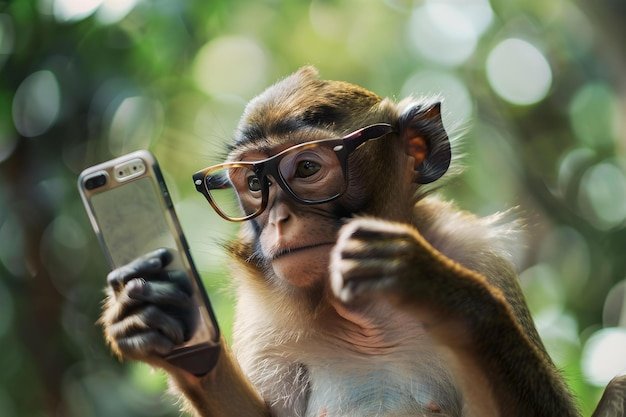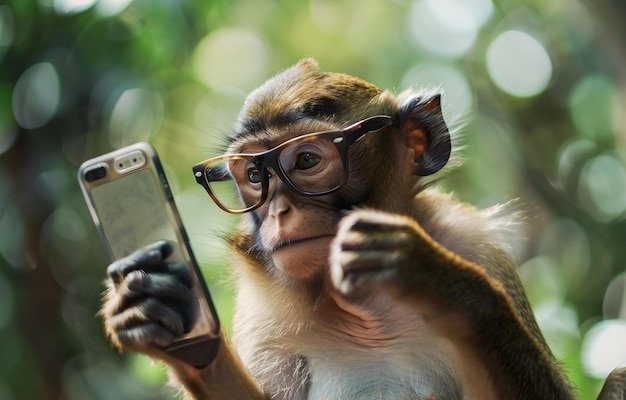
When we talk about monkey intelligence, it’s not just about how well they can do tricks or solve puzzles. It’s more like comparing a child learning to navigate the world—full of curiosity and problem-solving power. So, grab a coffee, and let’s dive into the clever world of monkeys and see just how smart they really are!
Understanding Monkey Intelligence
Monkey intelligence is a complex topic. They belong to the primate family, which includes humans, and share many cognitive abilities with us. For starters, monkeys can learn through observation. If one sees another using a stick to get termites from a tree, it’s likely to try the same method itself. Isn’t that amazing? It’s like when you watch a friend successfully bake a cake and think, “I can do that!”
Their ability to use tools is a key indicator of intelligence. Some monkeys use sticks, stones, and leaves to accomplish tasks that show their problem-solving skills. For instance, capuchin monkeys are known for using rocks to crack open nuts. This kind of behavior suggests a level of planning and understanding of cause and effect, which is pretty remarkable.
You might be wondering about their memory. Research shows that monkeys have impressive memories that help them in social situations, like remembering which individuals are dominant or have access to food. This social intelligence is crucial for their survival in the wild. They navigate complex social interactions, just like we do in our daily lives.
Types of Intelligence in Monkeys
Just like us, monkeys have different kinds of intelligence. Here are a few notable types:
- Social Intelligence: Monkeys are social animals. They live in groups, and their social dynamics can be quite intricate. They remember past interactions and behaviors of their peers, which helps them forge alliances and avoid conflicts.
- Problem-Solving Skills: When faced with challenges, monkeys can think outside the box. For example, some species have been observed figuring out how to access food that is out of reach, using tools or even teamwork.
- Emotional Intelligence: They display a range of emotions and can empathize with one another. You might see a monkey comforting another that has been hurt, showcasing their emotional awareness.
These kinds of intelligence not only highlight their cognitive abilities but also show us that they can adapt to various situations, making them quite clever.
Communication Among Monkeys
Have you ever noticed how monkeys seem to be having conversations with each other? Their communication skills are quite advanced. Monkeys use vocalizations, facial expressions, and body language to convey messages. It’s not just about making sounds—each noise has a purpose.
For example, some monkeys have alarm calls to warn others of predators. Each call can signal different threats, demonstrating their ability to convey specific information. Imagine if you had different tones of voice to warn your friends about various dangers; that’s the kind of communication we see in monkeys.
Moreover, studies indicate that some monkeys can understand basic syntax. This means they can combine different sounds to create more complex meanings. It’s like putting together words in a sentence to convey a new idea. This complexity in communication indicates a high level of cognitive functioning, similar to early human languages.
Learning and Memory in Monkeys
Learning is a huge part of monkey intelligence. Just like children, monkeys learn from their environment. They watch, copy, and practice until they master a skill. This learning process can be seen in how young monkeys imitate their parents or older group members.
Memory plays a crucial role here too. Monkeys can remember where they found food sources or recognize familiar faces. Some studies have shown that certain monkeys can even remember objects or locations long after the experience. Their ability to retain this information helps them thrive in their natural environments.
A great example is the *Japanese macaques*, known for washing their sweet potatoes in water. This behavior was learned by a few individuals and then spread throughout the group. This kind of cultural transmission reflects a higher cognitive ability, showing that monkeys can not only learn but also teach.
Social Structures and Behavior
Monkeys often live in complex social structures. Their social hierarchy dictates their behavior and interactions. Understanding these structures is essential to grasping their cognitive abilities.
In groups, monkeys develop relationships based on kinships, friendships, and rivalries. Strong social bonds can lead to cooperative behaviors, such as grooming and sharing food. Grooming isn’t just about hygiene; it strengthens social ties among monkeys, much like how friends bond over a shared meal.
You’ll also find that conflict resolution is a significant part of their social interactions. Monkeys have been observed using reconciliation behaviors, like grooming or playing, to mend relationships after fights. This capacity for empathy and understanding indicates a sophisticated level of cognitive processing.
How Smart Are Monkeys Compared to Other Animals?
When comparing monkey intelligence to other animals, especially mammals, you’ll find they rank quite high. Studies have shown that certain species of monkeys, like rhesus macaques, can solve complex tasks and learn from their mistakes, much like dogs or dolphins.
However, monkeys also face unique challenges that affect their cognitive development. Their social dynamics and environmental complexities can shape their intelligence in ways that differ from animals in solitary or less complex social structures. For instance, compared to the solitary nature of many big cats, monkeys thrive in teamwork, boosting their problem-solving skills.
To wrap it up, while monkeys are undeniably smart, each species has different strengths. It’s fascinating to consider that intelligence can take many forms, depending on an animal’s lifestyle and environment.
The Importance of Studying Monkey Intelligence
Understanding monkey intelligence helps us learn more about our own cognitive abilities. Researching how monkeys think, solve problems, and interact socially can shed light not just on animal behavior but also on human evolution.
Moreover, insights gained from these studies can influence conservation efforts. Knowing how these animals live and think can help conserve their habitats and ensure their survival. It’s all connected—by preserving monkey populations, we also maintain the ecological balance.
Here’s the thing: as we learn more about the cognitive abilities of monkeys, we deepen our appreciation for their complexity. They are not just cute and entertaining; they are intelligent creatures with rich emotional lives, deserving of our respect and protection.
By understanding how smart monkeys really are, we can foster a greater connection to the natural world and recognize the critical role that these animals play in our ecosystem. So next time you see a monkey, remember there’s a lot more going on in that little head than meets the eye!

